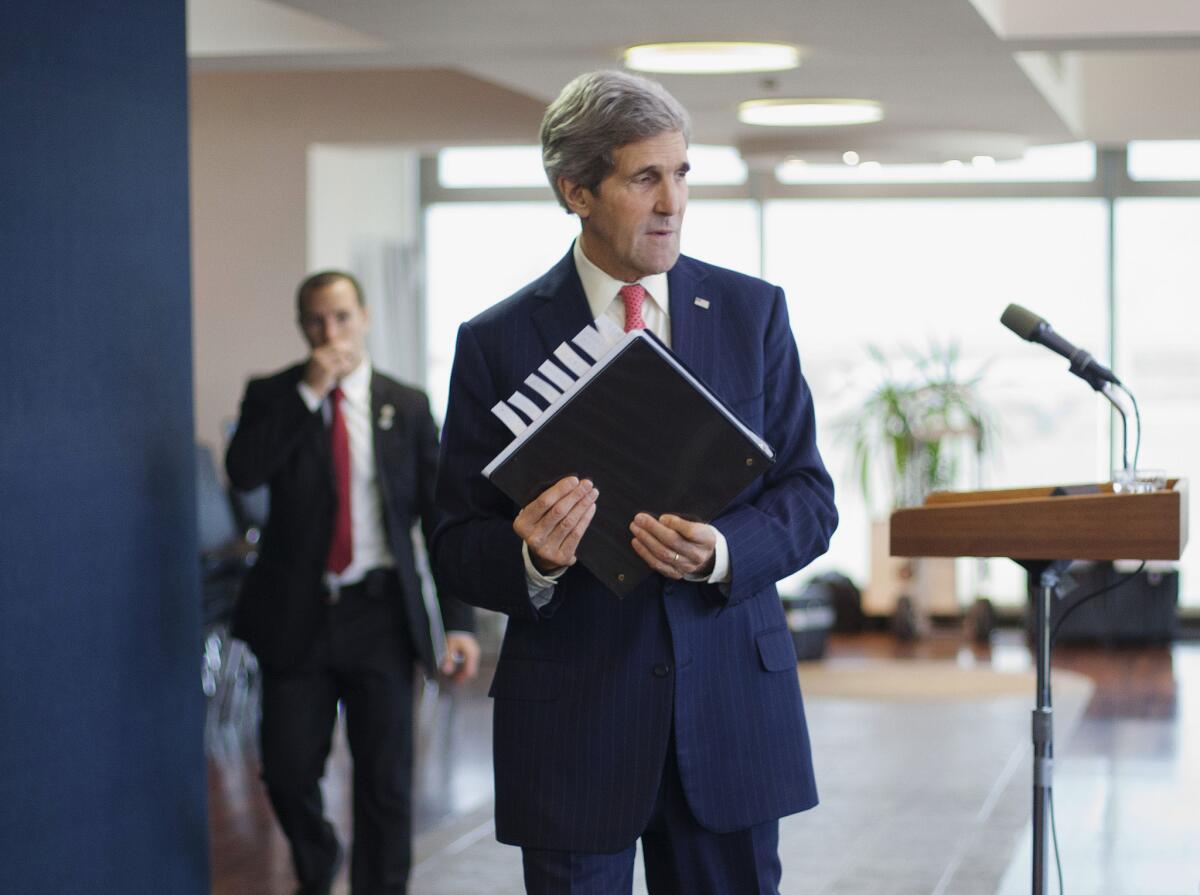John Kerry upbeat after latest Middle East peace push

- Share via
JERUSALEM -- U.S. Secretary of State John F. Kerry, concluding his latest effort to advance Israeli-Palestinian peace talks on Friday, sounding encouraged about progress despite ongoing tension between the parties.
“We are closer than we have been in years” to bringing peace to the region, Kerry told the press Friday morning before departing Israel for Washington.
After arriving in Israel on Wednesday night, Kerry met with Israeli Prime Minister Benjamin Netanyahu three times and once with Palestinian President Mahmoud Abbas.
He said he was encouraged by the “continued commitment of both leaders,” and advised observers to be patient. “The fact that there is no information doesn’t mean the talks are not productive,” Kerry said, reminding that the parties agreed to refrain from publicly discussing the negotiations.
Despite sharp disagreements, Kerry insisted both leaders have the “same endpoint in their sights: two nations for two peoples, living side by side in peace and prosperity.”
However, “neither peace nor prosperity are possible without security” Kerry said, touching the key focus of the talks.
Leaks from the negotiations that resumed in July suggest the process has become deadlocked, with Israel insisting that security arrangements in the West Bank -- in the Jordan Valley in particular -- be finalized before beginning discussions on any future border outline.
Israel contends that maintaining a physical military presence along the Jordan Valley is critical for securing the eastern border, controlling future border crossings and defending its airspace. The Palestinians reject this as a ploy to perpetuate the occupation.
In an effort to break the cycle, the U.S. has offered a package of security proposals, presented to Netanyahu by retired Gen. John Allen, special envoy for related security matters.
No official details were offered, but Israeli press reports suggested they include military equipment, early warning stations and various guarantees. Reportedly, the Palestinians flatly reject any Israeli military presence in the West Bank but might consider NATO or international forces.
Kerry revealed that Allen has been working with a team of American defense experts to assess threats to Israel’s security at every step of the final status negotiation process and how these may be addressed.
Some 160 people have “contributed one way or another” to Allen’s work, Kerry said, including the intelligence community, the Department of Defense, the State Department and the White House.
This suggests a shift in gears and approach to the peace talks, with the U.S. moving from mediator to facilitator and taking an increasingly active role in the process in order to move it onto practical tracks.
The Americans are beginning to understand that “external intervention is needed,” according to Barak Ravid of Haaretz, who wrote that Kerry will have to find a way to “shake up the two leaders and put them back on track” so that the talks do not implode.
Muhammad Shtayyeh, a Palestinian minister who recently quit the Palestinian negotiating team in protest of Israel’s repeated announcements of settlement expansion, says Israel enjoys too much comfort and impunity, and calls for the negotiations to be fully internationalized.
In a column in Haaretz on Friday, Shtayyeh suggested turning to the Geneva format that has proven useful regarding Iran and Syria, thus “exchanging the bilateral situation for a multinational forum.”
Shtayyeh asked if the multinational framework of the Geneva talks worked elsewhere, “then why not for Palestine?”
Kerry opened his comments Friday with a eulogy for Nelson Mandela, who “knew the future required that we move ... beyond the past.”
“He said it always seemed impossible until it is done, I think it is appropriate for us to think about that” in this context too, Kerry said.
ALSO:
Mexican officials seek thieves, likely sick from radiation
Friends, students reminisce about teacher slain in Benghazi, Libya
Pope Francis to set up commission on child sexual abuse by priests
More to Read
Sign up for Essential California
The most important California stories and recommendations in your inbox every morning.
You may occasionally receive promotional content from the Los Angeles Times.













